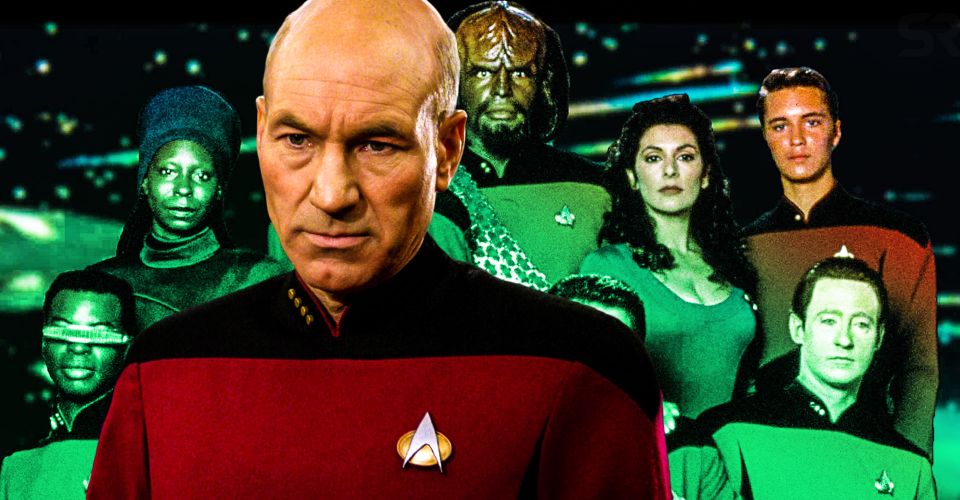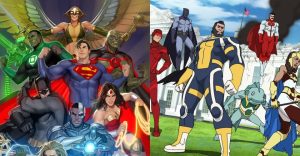Star Trek: Why TNG Ended After Season 7 (Was It Canceled?)

Star Trek: The Next Generation was canceled by Paramount in season 7 for a few reasons, including the studio’s desire to turn the TV series into a movie franchise. Created by Gene Roddenberry, TNG aired from 1987 to 1994 and it was the most popular syndicated series of all time, averaging 15-20 million viewers a week. TNG also launched three spinoffs, Star Trek: Deep Space Nine, Voyager, and Enterprise, as well as four movies from 1994-2002.
Starring Patrick Stewart as Captain Jean-Luc Picard, Star Trek: The Next Generation was set aboard the U.S.S. Enterprise-D, which was the flagship of the United Federation of Planets. Like its predecessor, Star Trek: The Original Series, TNG was an episodic show usually involving a problem-of-the-week that Picard and his crew encountered and solved. This was a crucial format for that era of TV before DVRs and streaming services that made serialization and binge-watching more appealing to viewers. Because TNG was syndicated, it aired at different times on different stations around the country. After a shaky start creatively, TNG found its footing in its third season and the show became lauded for its innovative stories that expanded the Star Trek canon. Given the unprecedented heights in popularity and ratings Roddenberry’s TNG achieved, it was a shock when Paramount announced season 7 would be the show’s last.
According to TNG‘s executive producer Rick Berman when EW interviewed him in 1994, “the decision to end Next Generation after a seven-season run was made at least two years and two Paramount regimes ago”. Paramount’s rationale for ending TNG was driven by the increasing budget for the series and the studio’s desire to keep the Star Trek movie franchise going. By the early 1990s, the films that starred the aging cast of TOS were waning, and Paramount saw TNG as the future of the Star Trek movies. The decision was thus made to end TNG as a series and relaunch it as a feature film franchise. Paramount originally planned to have the TOS and TNG casts meet in a movie, although that got pared down to Captain Picard joining forces with Captain Kirk (William Shatner) in what became 1994’s Star Trek Generations.

As Paramount’s executive producer of domestic television Joel Berman told EW in 1994: “The bottom line is that a successful feature-film franchise can be more profitable than a TV series. We thought it was time to launch Next Generation as a movie franchise, and we didn’t think we could do the television series at the same time.” The studio also felt secure that the TV franchise continued to be strong with Star Trek: Deep Space Nine already airing in syndication during TNG season 7 and Star Trek: Voyager preparing to launch on the United Paramount Network (UPN) in 1995.
Since TNG’s producers were aware the series would end in season 7 and get relaunched as a movie, they were able to plan a finale that would end the show on their own terms. TNG‘s series finale, “All Good Things”, is hailed as one of the show’s best episodes and was watched by 30 million viewers. TNG season 7 also received an Emmy nomination for Outstanding Drama Series. During the hiatus between TNG seasons 6 and 7, executive producers Ronald D. Moore and Brannon Braga wrote Star Trek Generations and the duo also wrote “All Good Things”.
However, not everyone involved in TNG was thrilled with the plan to end the hit series and morph it into a film. ”I haven’t been given any reason that holds water… I don’t know why the movie had to be made this year,” said Jonathan Frakes, who plays Commander William Riker, during the filming of TNG‘s finale. “Some of us kept hoping there would be an eleventh-hour reprieve, that Paramount would realize how much money the show has made for them and change their minds.” And yet, to paraphrase the title of Star Trek: The Next Generation‘s finale, all good things had to come to an end.
About The Author

















